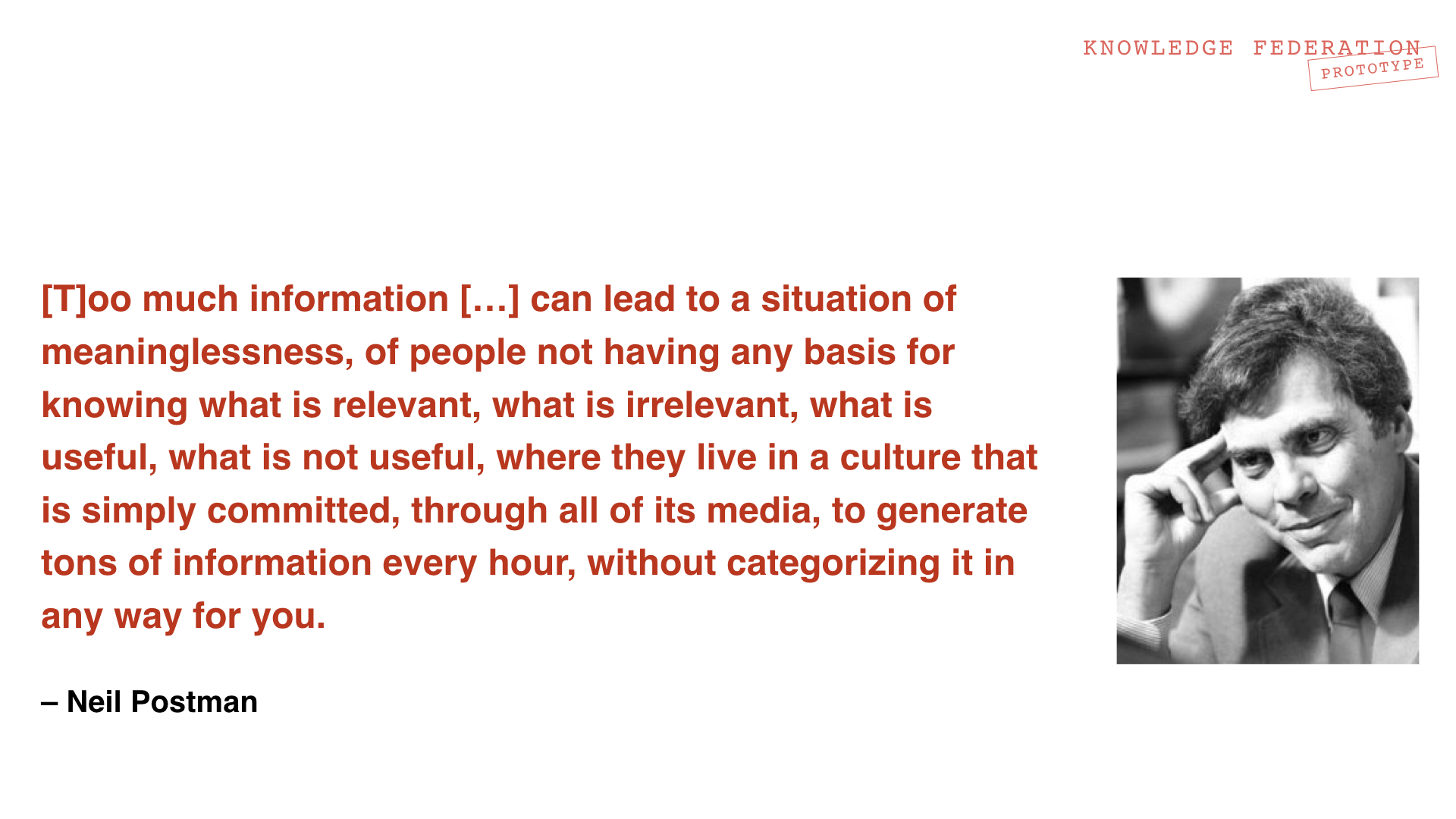Difference between revisions of "Holotopia"
From Knowledge Federation
m |
|||
| Line 1: | Line 1: | ||
| − | <div class="page-header" ><h1>Holotopia</h1></div> | + | [[File:<div class="page-header" ><h1>Holotopia</h1></div> |
<div class="row"> | <div class="row"> | ||
| − | <div class="col-md-3">< | + | <div class="col-md-3"><h3>Modernity needs lightbulbs, not candles</h3></div> |
<div class="col-md-7"> | <div class="col-md-7"> | ||
| − | [[File: | + | [[File:Postman-meaning.jpeg]] |
| + | <p>In 1990, at the time when Tim Berners Lee was writing the code for the World Wide Web, the NYU researcher in communication Neil Postman was warning us that too much information can lead to a most alarming situation—meaninglessness.</p> | ||
| + | </div> </div> | ||
| + | |||
| + | <div class="row"> | ||
| + | <div class="col-md-3"></div> | ||
| + | <div class="col-md-6"> | ||
| + | <p>Suppose we handled information as we tend to handle most other human-made things—namely that we adapted its properties and its use to the core purposes that need to be served. Such as providing <em>correct</em> meaning. What would this information be like? In what way would it be created? What consequences would it have?</p> | ||
| + | |||
| + | <p>Etc.</p> | ||
| + | |||
| + | </div> | ||
| + | <div class="col-md-3"> | ||
| + | [[File:Modernity2.jpg.]] | ||
| + | </div> </div> | ||
| + | |||
| + | <!-- | ||
| + | |||
| + | |||
| + | researcher in communication, described the consequences of | ||
<small>By depicting our civilization as a bus, and our handling of information and knowledge as its candle headlights, the Modernity <em>ideogram</em> renders our contemporary condition in a nutshell.</small> | <small>By depicting our civilization as a bus, and our handling of information and knowledge as its candle headlights, the Modernity <em>ideogram</em> renders our contemporary condition in a nutshell.</small> | ||
<p>We have developed and proposed <em>knowledge federation</em> as a new approach to knowledge, or technically a [[Holotopia: Paradigm|<em>paradigm</em>]]. In <em>knowledge federation</em>, information and knowledge are considered as created by people for people, to fulfill all those essential purposes that information and knowledge need to fulfill; notably to provide us suitable "know-what" or orientation, in the complex reality we've created.</p> | <p>We have developed and proposed <em>knowledge federation</em> as a new approach to knowledge, or technically a [[Holotopia: Paradigm|<em>paradigm</em>]]. In <em>knowledge federation</em>, information and knowledge are considered as created by people for people, to fulfill all those essential purposes that information and knowledge need to fulfill; notably to provide us suitable "know-what" or orientation, in the complex reality we've created.</p> | ||
| Line 231: | Line 250: | ||
<blockquote>"One necessary condition of successfully continuing our existence is the creation of an atmosphere of hope that the huge problems now confronting us can, in fact, be solved—and can be solved in time." | <blockquote>"One necessary condition of successfully continuing our existence is the creation of an atmosphere of hope that the huge problems now confronting us can, in fact, be solved—and can be solved in time." | ||
</blockquote> | </blockquote> | ||
| + | ]] | ||
Revision as of 15:10, 22 March 2020
[[File:Holotopia
Modernity needs lightbulbs, not candles
Suppose we handled information as we tend to handle most other human-made things—namely that we adapted its properties and its use to the core purposes that need to be served. Such as providing correct meaning. What would this information be like? In what way would it be created? What consequences would it have?
Etc.

